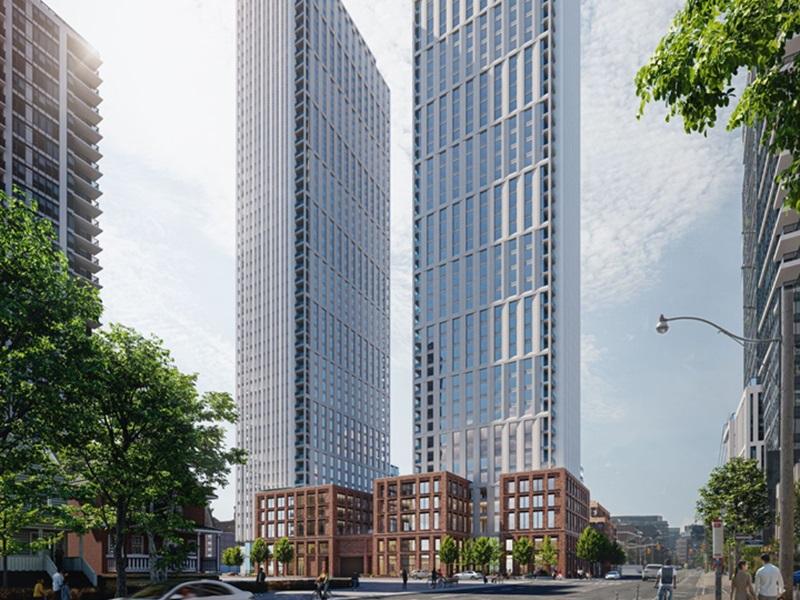
RioCan REIT (REI-UN-T) president and CEO Jonathan Gitlin says the REIT will delay new construction projects due to economic conditions as it reported a net loss, but strong revenue and development metrics, in its Q3 2023 financials.
“We already have hundreds of millions of dollars of projects in the ground that are going to be delivered over the next little while or have already been delivered,” Gitlin told RENX, noting those projects will continue but anything that is shovel-ready would be delayed. “Our residential ambitions are significant and we fully intend on achieving those ambitions.
“But in this very short-term environment, we're looking to pause momentarily to catch our breath and see what's going on with all of those other factors like interest rates and inflation costs, and then determine our next steps once we have a little more clarity on some of those line items.”
RioCan posted a Q3 net loss of $73.5 million compared to $3.2 million of net income a year earlier – due to fair value losses of $199.5 million compared to $118.8 million in Q3 2022, primarily from increasing capitalization rates resulting from rising interest rates.
On the plus side, RioCan generated record retail occupancy of 98.3 per cent, a new leasing spread of 21 per cent and same-property net operating income (NOI) in excess of its target range while development deliveries added a steady stream of new revenue in its fiscal third quarter.
CEO Jonathan Gitlin upbeat
It’s no surprise that, despite the moratorium on new development, Gitlin was upbeat during a Nov. 3 interview with RENX following the release of RioCan’s financial results for the three and nine months ended Sept. 30.
“Quality retail with the kind of demographics and locations that we have is in really limited supply because no one’s built any new retail in the last decade and no one can really build any new retail now because replacement costs are vastly in excess of the existing market value for retail,” Gitlin told RENX.
“In order to justify building new retail, you've got to get rents that are so much higher than what the market rents are. And because of that supply constraint, it allows for upward pressure on retail rents. That's what we're seeing now in this market.”
More than 92 per cent of RioCan’s properties are in major Canadian markets after years of selling properties in smaller markets and developing new assets in the bigger cities.
The trust's properties continue to attract strong and stable retail tenants, which comprise 87.4 per cent of annualized net rent.
For these reasons, there’s no push to build new pure retail assets even on properties RioCan already owns and can intensify.
“What we do is replace retail,” Gitlin said. “When we do mixed-use properties, we're typically taking an older shopping centre that has a 25 per cent coverage ratio with a vast parking lot and we'll replace either all of it or part of it with retail at grade and then residential above it.”
The Well is performing well
One of those mixed-use properties is The Well at the corner of Front Street and Spadina Avenue in downtown Toronto, which Gitlin said has met and sometimes exceeded his high expectations from both residential and retail leasing perspectives.
Occupancy commenced at FourFifty The Well, part of the ambitious project’s purpose-built residential rental component, on Aug. 1.
Construction of 236 units was completed in the most recent quarter and the remaining 356 will be completed in phases through Q4 2023 and early 2024.
Pre-leasing started in March and units are leasing at a healthy velocity at rates in line with or above expectations.
About 63,000 square feet of commercial space was also completed at The Well during Q3.
Approximately 96 per cent of the total commercial space at The Well is leased, with approximately 89 per cent (or 1.32 million square feet at RioCan’s 100 per cent ownership interest) in tenant possession, as of Nov. 2.
The retail component is 91 per cent leased with another two per cent in late-stage negotiations.
New additions to the tenant roster, including Lululemon and Sephora, will further enhance the retail mix. Retail at The Well has been opening in phases and the majority of tenants are expected to be open by the end of 2023.
“It's really something that will be well-received by the city of Toronto,” Gitlin said.
He noted that RioCan, Allied Properties REIT, tenants and members of the local community are already pleased with the results and looking forward to what The Well will still deliver.
RioCan Living

Of the 13 RioCan Living buildings in operation, 11 were stabilized and 97.5 per cent leased on Nov. 2. Total NOI generated from Q3 residential rental operations was $5.6 million, up $1.8 million or 46.3 per cent from the same period last year.
An increase of approximately eight per cent in average monthly rent per occupied square foot on a same-property basis contributed to the year-over-year improvement. Gitlin doesn’t expect those eight per cent increases to continue, however.
“The residential environment is really constrained because there is a housing crisis in Canada, and Toronto in particular, and you're seeing that manifest itself in these rental results,” Gitlin explained. “We don't prognosticate in our pro formas continuous increases like that.”
Large development pipeline
RioCan has a zoned development pipeline of 16.8 million square feet, with 45 per cent for residential rental and 40 per cent for condominiums and townhouses based on current market assumptions, as well as 13 per cent for retail and two per cent for office.
The REIT continues to revisit zoning applications to optimize density and improve project economics.
“Every single one of our projects is a candidate for us to go back and re-establish the zoning and entitlement parameters,” said Gitlin.
The 2,605 condo and townhouse units that were under construction at U.C. Towns 2, the second and third U.C. Towers (Oshawa's U.C. developments are in partnership with Tribute Communities), 11YV (where Metropia and Capital Developments are partners), Queen & Ashbridge (a partnership with Context) and Verge as of Sept. 30 are expected to generate sales revenue of over $800 million between 2023 and 2026 that can be redeployed to uses such as paying down debt or development.
Of RioCan’s six active condo construction projects, 86 per cent of the units are pre-sold, representing 95 per cent of pro forma total revenues.
Property dispositions and acquisitions
RioCan sold a 12.5 per cent stake in 11YV during the quarter, reducing its ownership share in the luxury condo in Toronto’s upscale Yorkville neighbourhood to 37.5 per cent.
“We sold it to individuals who are familiar with the project,” said Gitlin. “It’s effectively monetizing part of our profits that are going to happen in the future.
“We have a significant amount of profit coming in 2025 and this was an opportunity where we had a willing counter-party who was interested in buying a piece of that project now. We're not losing out on the eventual profit that we would have otherwise received and it just allows us to bring in some of those gains a little bit earlier on.
“That project has largely been de-risked. It’s not like the purchaser of that interest is taking a risk and it's not like we're giving up too much. It was a very good outcome for all of us.”
RioCan had closed on $140.2 million in dispositions and was firm on another $155 million worth of non-core asset dispositions as of Nov. 2. Closed sales included an enclosed shopping centre in Winnipeg and a movie theatre-anchored centre in Gatineau, Que.
RioCan’s year-to-date acquisitions total $110.1 million, including residential rental properties, land assemblies for development and an income-producing parking lot lease to remove a significant encumbrance at one of its “Focus Five” projects.
RioCan’s “Focus Five” properties
“Focus Five” projects are large-scale, transit-oriented, mixed-use developments in the Greater Toronto Area that RioCan is advancing through zoning and site plan approval processes.
Those projects are:
- RioCan Hall, a 227,000-square-foot income-producing retail site in downtown Toronto where RioCan is contemplating approximately 900,000 square feet of mixed-use density through a two-tower development comprising entertainment, retail and office uses as well as close to 700 residential units;
- RioCan Leaside Centre, an 8.8-acre site in Leaside zoned for about a million square feet of mixed-use density that would offer approximately 1,450 residential units, retail and public spaces;
- RioCan Colossus Centre, a 60-acre site at Highways 400 and 7 in Vaughan that consists of 571,000 square feet of income-producing retail space but where RioCan would like to introduce about 10 million square feet of density for over 11,000 residential units, retail and office space;
- RioCan Scarborough Centre, in the Golden Mile area along Eglinton Avenue East in Scarborough, where a transit-oriented mixed-use community totalling 4.3 million square feet and almost 5,000 residential units is planned;
- and Shoppers World Brampton, a 700,000-square-foot income-producing retail property where a 4.1-million-square-foot mixed-use development that would include about 4,700 residential units is proposed.
Slow time for transactions and developments
Gitlin said the transaction market for acquiring land or income-producing properties is currently opaque and that none of Canada’s largest real estate owners have any desperation to do anything.
“There's a bit of a disconnect between what the bid is and what the ask is on properties and — in that kind of environment, particularly when you don't have much for sale — you’re just not seeing a lot of transactions.”
Rising costs and interest rates, hesitant lenders and a depressed condo market have led some developers to put condo launches on hold.
Gitlin believes the condo markets in Toronto, Vancouver and Montreal will bounce back once there’s more clarity with interest rates and said the asset class will always be a part of RioCan’s product mix.
However, as a REIT that distributes income, it will always favour purpose-built rentals.
Gitlin said the federal government’s Sept. 14 announcement to remove the five per cent goods and services tax from the construction costs of new apartment buildings, and with some provincial governments following suit, is a great step forward.
However, it comprises just one line item. Interest expenses, labour and material costs must also be considered when deciding whether to green-light a development.
RioCan is solid from a liquidity standpoint
RioCan had $1.6 billion of liquidity at the end of Q3, comprised of a $1.1 billion undrawn revolving line of credit, $400 million in undrawn construction lines and other bank loans, and $100 million in cash and cash equivalents.
The trust had unencumbered assets of $8.5 billion.
RioCan’s share price closed at $18.33 on the Toronto Stock Exchange on Nov. 3, at the lower end of the 52-week high ($23.59) and low ($16.32) scale.
Gitlin said the REIT’s share repurchase program was a good way to allocate capital last year, but it would now have to use debt to finance buying back shares — which he doesn’t believe is prudent at the moment even though they’re trading for well below net asset value.










